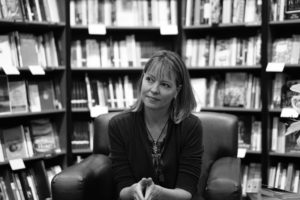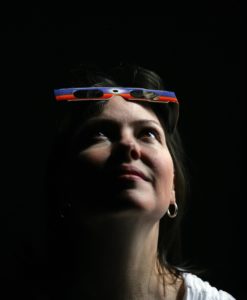At about 11:35 a.m. Mountain Time on Monday, August 21, Dr. Kate Russo, looking into the sky from a Wyoming mountaintop, will experience her 11th total eclipse of the sun.
The choice of the verb “experience” is intentional. One does not simply “watch” a total eclipse. These rare spectacles spark intense emotional reactions—everything from slack-jawed awe to spiritual exhilaration to primal fear.
Russo, a former clinical psychologist and current eclipse chaser, has been studying these events—and people’s reactions—since 1999. Personally, she’s magnetically drawn to solar eclipses for the strong feelings and memories they produce. Professionally, she observes and analyzes the wide range of emotions of people who look upward, and inward, during those magical, mysterious minutes of being in the shadow of the moon.
 Being in the Shadow is also the title of her new book, in which Russo interviewed many who have experienced total eclipses. From the back cover: “[T]hese individuals shuddered with fear and anticipation as the light dimmed, the temperature dropped, and then suddenly their world plunged into an eerie darkness. They gazed in awe at the eclipsed Sun, feeling a sense of connection and unexpectedly gaining new life insights.”
Being in the Shadow is also the title of her new book, in which Russo interviewed many who have experienced total eclipses. From the back cover: “[T]hese individuals shuddered with fear and anticipation as the light dimmed, the temperature dropped, and then suddenly their world plunged into an eerie darkness. They gazed in awe at the eclipsed Sun, feeling a sense of connection and unexpectedly gaining new life insights.”
In another book, Total Addiction, Russo notes that some people even have experiences that are, well, rather sensual. She writes of the impact of “totality,” that moment during an eclipse when the Sun is entirely occluded by the moon. “Emotions are intense,” she writes, “with some breathing heavily, screaming, or crying.” Endorphins are released, resulting in euphoria. She calls it an “intellectual orgasm.”
Russo, a former assistant course director at Queen’s University Belfast, is an expert in Interpretative Phenomenological Analysis (IPA), the science of studying people’s subjective experiences.
ORBITER magazine caught up with Russo recently to talk about the eclipse, her experiences, and her observations of people’s reactions.
ORBITER: Where will you be for the eclipse?
Kate Russo: Grand Teton National Park, leading a tour of 33 international eclipse chasers. We’re going up in one of the gondolas and viewing from up top. We’re going to have a great view.
You saw your first eclipse in 1999 in France. Tell me about that.
I’ve always loved travel. When we went to France, I thought it was just going to be another travel destination, that I would enjoy the eclipse, and that would be it — that I would just go on to the next travel adventure. I had no idea that it would be so awesome. You hear about how it goes dark during the day, and on one level you understand that. But when it actually happens, it’s so out of the ordinary and unexpected, it just blows your mind. You can’t communicate the rush of emotions — the primal fear, the hair standing up on the back of your neck, the goosebumps, the euphoria, the excitement of feeling at one with the universe. It’s all so powerful, and then it’s over.
I knew that my life had been touched in a way that I was changed. I knew from that moment that I needed to see this again. And my second totality experience really anchored it into me. This is not just a once off. This is something I want to do for the rest of my life. And over the last five years, most of my spare time is devoted to researching and writing about them, blending my career as a psychologist into my career as an eclipse chaser. Now they’re very much merged into one.
Let’s explore the science of the wide range of emotions. People experience awe. People collapse, weeping. People call it a spiritual experience. And so much more. It seems to be more than just the kind of awe we feel when looking at the Grand Canyon or an amazing sunset. What’s going on here?
It is above and beyond those other types of experiences. Are you familiar with the overview effect? It happens when astronauts go into space and see Earth from completely outside, and they have this complete transformative experience. When they come back to Earth, they understand how fragile our world is, and they become really focused on sharing this with other people. So I guess the total solar eclipse experience is as close as we can get to that “overview effect” on Earth.
What separates us humans from animals in our experience of a total solar eclipse? Dairy cows return to the barn, crickets chirp, birds roost, whales breach. What makes humans unique?
Animals are just responding to things going dark. We all — humans, animals, plants, bacteria — have circadian rhythms that respond to the changes in light. Animals are much more primitive than us, and their changes in behavior are much more rapid. But humans don’t immediately change our behavior when the light dims. In totality, we are aware of what’s going on, but animals aren’t. There’s still a primitive part of us that is aware that something out of the ordinary is happening, that we need to pay attention. Our bodies are picking up that something is really strange, putting us on “high alert.” We seem to take everything in, and we’re just hypervigilant to everything around us — the rapid changes in light, the shadows, the temperature, the changes in the wind. Animals pick up on it too, but we’re able to reflect on it as intelligent beings.
